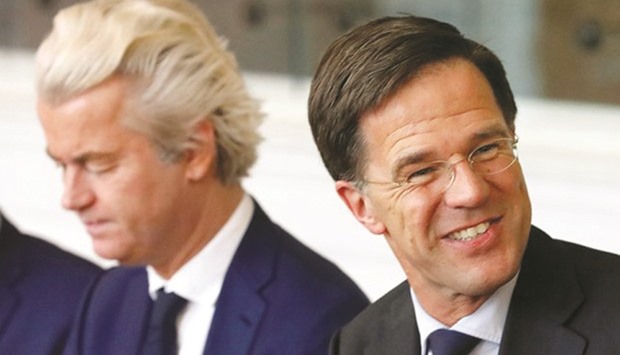If we are to believe the international media, last week the brave Dutch electorate defeated populism by denying the bid by the Party for Freedom (PVV) of “the Dutch Trump”, Geert Wilders, to become the biggest party in parliament. Whether this is just a Dutch phenomenon, or whether populism more widely has peaked, seems to be the new topic of speculation – although some commentators simply shifted their gaze to Paris to apply the same analysis to the upcoming French presidential elections.
The Dutch elections were never about the defeat or victory of populism. Polls have shown for years that the biggest party in the country – be it the PVV or the conservative People’s Party for Freedom and Democracy (VVD) of the prime minister, Mark Rutte – would at best get a quarter of the votes, probably many fewer, and have to start the arduous process of building a coalition government of four to five parties. Even if the PVV were included in this coalition– though all other relevant parties had discounted this possibility – it would be the only populist party in government. Hardly a victory for the phenomenon.
There were always two Dutch elections: one in the international media, framed as the latest iteration of the overarching struggle between an emboldened populism and an embattled establishment, and one in the Dutch media, which tried to capture the full range of political developments – including the emergence of several new populist radical right parties (such as FvD and VNL), the growing success of cosmopolitan parties (D66 and GL), the rise of a “Turkish” party (DENK), and the imminent implosion of the social democrats (PvdA).
Geert Wilders was beaten, but at the cost of fuelling racism in the Netherlands
To be fair, the “neck and neck race” between Rutte and Wilders long dominated much of the Dutch media coverage too. Premier Rutte made a consistent effort to present himself as the only politician who could keep Wilders from power, although emphasising his “irresponsible” or “unserious” politics rather than his populism. In fact, on election night Rutte declared in his victory speech that the Netherlands had put a halt to “the wrong kind of populism”, implying that there is a good kind of populism, and suggesting he was a proponent of it.
Everyone in the Netherlands knows what Wilders, one of the longest serving politicians in the country, stands for: nativism, authoritarianism and populism. It is roughly the same agenda shared by the likes of Marine Le Pen (FN) in France, Frauke Petry (AfD) in Germany, and Donald Trump in the US.
The only way Wilders stands out from his ideological brothers and sisters is his uncompromising position on Islam, which takes Islamophobia to a whole new level. Almost half of his one-page election manifesto, with the Brexit- and Trump-inspired title “The Netherlands Ours Again”, was devoted to the “de-Islamisation” of the country, and included proposals such as the closing of all mosques and Islamic schools and a ban on the Qur’an.
Rutte is not the only mainstream politician to suggest that “bad” populism can only be defeated by “good” populism. It is also a popular position within the crisis-ridden social democratic parties of Europe, including the Labour party in the UK. In most cases it seems to mean a (slightly) lighter form of not just populism – mainly directed at the European elites – but also of authoritarianism and nativism. And in the Dutch election, the campaigns of the two mainstream right-wing parties, the Christian Democratic CDA and the conservative VVD, were both increasingly informed by authoritarianism and nativism.
The leaders of both parties pretended to defend “Dutch” and even “Christian” values against an alleged threat of Islam and Muslims as well as their secular, left-wing fellow travellers. Even as a majority of Dutch people worried about healthcare and the welfare state, CDA leader Sybrand Buma and premier Rutte were defending “Christian” traditions like Easter eggs and Christmas trees and racist traditions including Black Pete (Zwarte Piet). Moreover, Rutte suggested that there were real Dutch people and probationary Dutch people, ie those with (Muslim) immigrant roots, and called on the latter to “act normal” or “sod off” (where to remained unclear).
Given that the next coalition government will almost certainly be led again by Rutte, and will have the CDA and VVD as its core constituents, the question is how much the electoral “defeat” of Wilders will really mean. If the difference between “good” and “bad” populism is mainly a matter of degree – ie how authoritarian and nativist one is – Wilders might have the last laugh after all.

Dutch Prime Minister Mark Rutte, right, and far-right politician Geert Wilders at a meeting in parliament after the general election.
